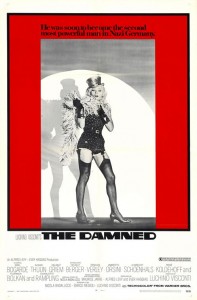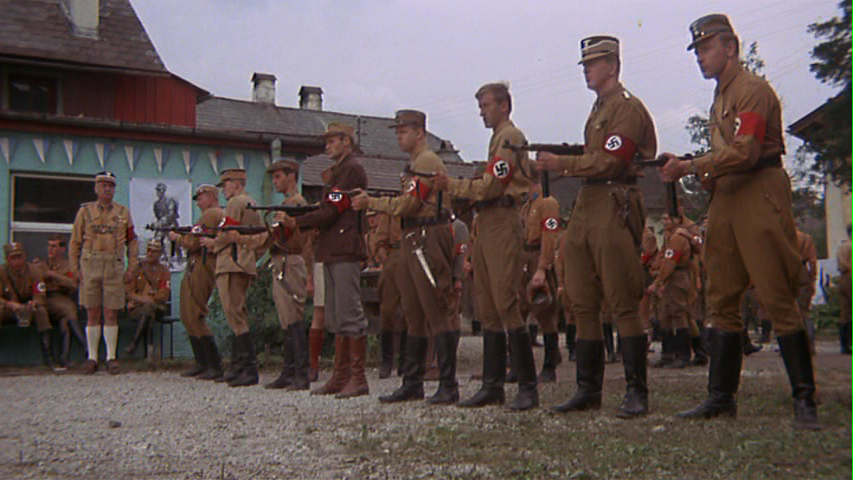|

Synopsis:
In early 1930s Germany, the wealthy von Essenbeck steelworks family members — including its soon-to-be-murdered magnate (Albrecht Schoenhals), a ferociously ambitious mother (Ingrid Thulin), her pedophilic son (Helmut Berger), her power-hungry lover (Dirk Bogarde), and a Nazi-loving Brownshirt (Reinhard Kolldehoff) — find themselves trapped in a web of corruption, intrigue, and murder.
|
|
Genres, Themes, Actors, and Directors:
- Dirk Bogarde Films
- Family Problems
- Luchino Visconti Films
- Nazis
- Pedophiles
- World War II
Review:
Luchino Visconti’s epic saga of familial corruption and depravity — notorious for its original “X” rating — is a tough pill to swallow. While many critics (at the time and now) view it as brave, intelligent, and artistic, all I see is plenty of bombastic emperor’s clothing. It’s hampered by several serious flaws: horrendous dubbing (what was Visconti thinking?!), lame performances (very few actors, despite their credentials, emerge unscathed), overly self-conscious camera techniques (Visconti relies on zoom shots far more than he should), and a poorly written, convoluted script. In truth, The Damned is a tedious, never-ending affair, only redeemed (partially) by its sumptuous cinematography and costumes.
Redeeming Qualities and Moments:
- Helmut Griem as Commander Aschenbach

- An effective (albeit historically suspect) recreation of the Night of the Long Knives gathering and massacre

Must See?
No. While it holds some historical importance for its Oscar-nominated (!) screenplay and its erstwhile status as an X-rated import, I can’t in good conscience recommend it as must-see viewing. Listed as a film with Historical Importance in the back of Peary’s book.
Links:
|
One thought on “Damned, The (1969)”
Not a must.
My decision to rewatch ‘The Damned’ after posting on ‘Hurry Sundown’ is, for lack of another expression, a ‘happy accident’ – mainly because, for me, they have a few things in common: both sport a cast largely comprised of leading characters (though Visconti’s is smaller in the ‘A-list’ actor department); both flirt with overblown handling of a hot button topic; both are pompous.
The bottom line, though, is this: while I would recommend that ffs give ‘HS’ a try, I would – well, I wouldn’t tell ffs to avoid ‘The Damned’ (necessarily), but the average Visconti film tends to be a demanding (and draining) experience, even for a hardcore ff like myself who, in a sense, will sit through just about anything that doesn’t put me to sleep. While, on some bizarre level, ‘The Damned’ shares the ‘you can’t look away’ aspect that ‘HS’ has, it gradually advances to a plateau of major histrionics that leaves the viewer numb, cold and not particularly informed about its politics (the latter perhaps due to an apparent preference for effect rather than cause). [In its defense, I will say that the dense screenplay does a good job in basically keeping the many characters straight and defining who wants what from whom.]
I do not claim to be anything resembling an expert on the labyrinthine specifics of the factions at odds during this time in history. I do know enough, I think, to accept ‘The Damned’ in its illustration of the madness of ‘the unleashing of the dogs’, and can even find it intriguing (and believable) as a portrait of people using the current political climate to achieve the self-serving ends they would otherwise be unable to secure.
But, for the average ff, you are on your own here, kids. I saw it when it was first released in the US (~so I was 16. Our local, small-town theaters, surprisingly, were nothing if not eclectic: a Disney film one week, ‘The Damned’ the next. Film ratings had been put into effect but the theaters were a bit lax on enforcement. And, to me, for the most part, a film was a film was a film. A startling film wouldn’t usually particularly shock me – but an incompetent one would!). I don’t think I’ve revisited the film til now. It’s not something I feel drawn to return to.
We’ve had tons of movies on Nazi Germany before and since 1969. I would venture a guess that there are now more films about that period than any other period in history (and they just keep coming). Many of them appear more balanced and, at any rate, are less concerned with rubbing your face in depravity.
Visconti seems to have spent the bulk of his time concentrating on how his film looked visually (and, granted, it is often stunning). Re: that aspect, I agree with the person writing at IMDb that he gets “a great performance” out of his overall design and costumes (bringing to mind the approach of someone like Vincente Minnelli).
The actors do come off a bit at sea, though they generally try hard. Some are asked to try a bit too hard (Bogarde, Thulin, Berger – the latter a bad actor, though here that actually works to his advantage). The ones allowed more normalcy (Charlotte Rampling, Umberto Orsini, and esp. Griem – who would go on to be just as effective in ‘Cabaret’) fare much better.
Some of the more sensational elements are questionable. Although the roots of incest are (eventually) presented with matter-of-fact candor, we’re left to guess about much of the resultant pathology. As well, would a very, very young girl have such a pronounced awareness of molestation – to the degree that she would climb the stairs like the suicidal Andrea Leeds in ‘Stage Door’ and, on top of that, have the physical ability to hang herself? And why do we get the impression that the Brownshirts had a membership policy that excluded heterosexuals? Yes, Ernst Rohm was gay but did he really surround himself with what looks like a considerable army of gay men?
I suppose I could go on – but you stand warned. I will add, though, that I do not for one minute consider ‘The Damned’ to be in any way camp. It may be warped, with a detached yet somehow personal POV, but it knows what it’s doing.